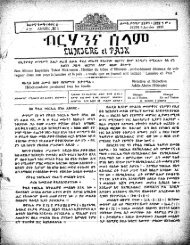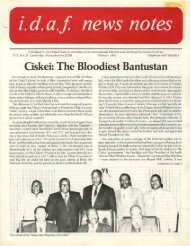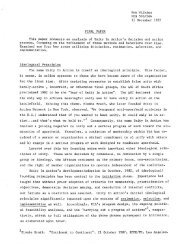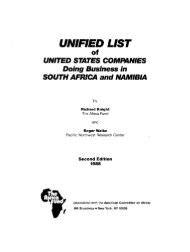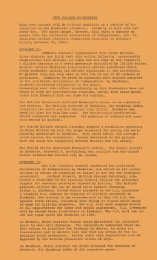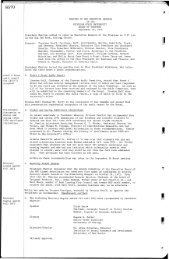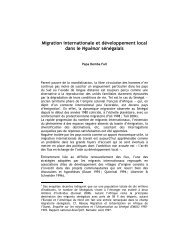the churches and southern africa - KORA
the churches and southern africa - KORA
the churches and southern africa - KORA
Create successful ePaper yourself
Turn your PDF publications into a flip-book with our unique Google optimized e-Paper software.
Africa Bureau, 48 Grafton Way, London W1, Engl<strong>and</strong>.<br />
The World Council of Churches Program to Combat<br />
Racism announced plans to develop targets for<br />
anticorporate actions <strong>and</strong> urged that all investment be<br />
withdrawn from South Africa. (SCC Pr.ess Release, May 5,<br />
1972; see also CHURCHES section, this issue.)<br />
LIBERATION SUPPORT<br />
Increased aid to <strong>the</strong> OAU Liberation Committee has<br />
not only stemmed from African States. In May <strong>the</strong> Soviet<br />
Union announced a grant of about $18,000 to <strong>the</strong> OAU<br />
to be used for broadcasting to Sou<strong>the</strong>rn Africa. The<br />
USSR also plans to send ten times that amount in medical<br />
<strong>and</strong> educational supplies to <strong>the</strong> liberation movements.<br />
(Agence France Presse, May 26, 1972; Star,<br />
Johannesburg, June 10, 1972) The Secretary for External<br />
Affairs of Guyana recently visited Zambia to discuss this<br />
year's Non-Aligned Nations Conference, <strong>and</strong> pledged<br />
more aid to <strong>the</strong> struggle, including $25,000 to <strong>the</strong> OAU.<br />
(Times of Zambia, June 17, 1972)<br />
President Amin of Ug<strong>and</strong>a met with representatives of<br />
FRELIMO, MPLA, <strong>and</strong> PAIGC in May <strong>and</strong> called for a<br />
focus of action, citing Mozambique as <strong>the</strong> keystone to<br />
liberating <strong>the</strong> rest of Sou<strong>the</strong>rn Africa. His Minister of<br />
Foreign Affairs has spearheaded a drive for liberation<br />
funds by raising $50,000 through dances <strong>and</strong> dinners.<br />
Amin in continuation of his attempts to create new<br />
African military strategies, has called for joint African <strong>and</strong><br />
Soviet naval maneuvers in <strong>the</strong> Indian Ocean. (Agence<br />
RHODESIA AND SANCTIONS<br />
On July 11 <strong>the</strong> American Committee on Africa<br />
announced arrival of <strong>the</strong> following Rhodesian products in<br />
<strong>the</strong> port of Baltimore: on July 15 via <strong>the</strong> SS African Sun<br />
(Farrell; call letters KLOA), 80 drums of nickel<br />
magnesium from Cape Town (notified party is Kaiser<br />
Trading Co. of Oakl<strong>and</strong>, Calif.), 60 drums of nickel<br />
cathodes from Durban (notified party is Quast & Co.),<br />
<strong>and</strong> carbon ferrochrome from Lourenco Marques<br />
(notified party is Engelhard Minerals of 299 Park Ave.,<br />
New York City); on July 30 via <strong>the</strong> SS Mormaccove<br />
(Moore-McCormack Lines), 62 drums of nickel<br />
cathodes-electrolytic from Durban (notified party is<br />
Philipp Bro<strong>the</strong>rs, a division of Engelhard <strong>and</strong> located also<br />
at 299 Park Ave.). (See ACTION NEWS AND NOTES,<br />
this issue, for protests against <strong>the</strong>se iiports.)<br />
In its 40 to 36 decision on May 31 to delete <strong>the</strong><br />
section of <strong>the</strong> State Department Authorization Bill which<br />
would have thrown out <strong>the</strong> Byrd Amendment breaking<br />
sanctions, <strong>the</strong> Senate divided in roughly <strong>the</strong> same fashion<br />
as in October, 1971. Senator Stevens (Alaska) switched<br />
France Presse, May 25, 1972; Daily News, Tanzania, June<br />
15, 1972; Ug<strong>and</strong>an Radio Broadcast, May 10, 1972)<br />
A group called AFRICA 71 in Denmark has<br />
contributed an ambulance to MPLA. (Zambia Daily Mail,<br />
'June 13, 1972)<br />
The International Confederation of Trade Unions<br />
sponsored a meeting in Addis Ababa for African trade<br />
unionists which reaffirmed support for South African<br />
workers, denounced South Africa's repression of<br />
Namibian strikers, <strong>and</strong> condemned Portugal. At a later<br />
ga<strong>the</strong>ring in London, Chairman of <strong>the</strong> U.N. Special<br />
Committee on Apar<strong>the</strong>id, Ambassador Farah of Somalia,<br />
called on British trade unions, which he said had more<br />
than $30 million invested in firms with South African<br />
affiliates, to join with o<strong>the</strong>r institutions in challenging <strong>the</strong><br />
corporate role in South Africa. A Trade Union Council<br />
official disputed Farah's figure but said it was concerned<br />
with <strong>the</strong> role of <strong>the</strong> multinational corporation abroad.<br />
(Zambia Daily Mail, June 2, 1972; Guardian, U.K., July<br />
13, 1972)<br />
Dutch imports of coffee <strong>and</strong> oil decreased substantially<br />
in 1971 as a result of concerted campaigns <strong>and</strong> boycotts.<br />
Although Dutch exports to Angola increased, imports<br />
dropped by 24 percent. The full impact of <strong>the</strong> boycott of<br />
Angolan coffee will not really be felt until 1972. Gulf Oil<br />
in <strong>the</strong> Ne<strong>the</strong>rl<strong>and</strong>s has guaranteed not to import Cabinda<br />
oil for a year. (Agence France Presse, June 3, 1972)<br />
In Mozambique some importers have begun to stop<br />
buying Danish <strong>and</strong> Dutch goods. (Star, Johannesburg,<br />
May 6, 1972)<br />
THE U.S. AND SOUTHERN AFRICA<br />
from <strong>the</strong> Byrd to <strong>the</strong> McGee side while Senator Roth<br />
(Del.) went in <strong>the</strong> opposite direction. Senator Taft, under<br />
pressure from Ohio companies, voted for Byrd.<br />
C<strong>and</strong>idates McGoyern, Muskie, Humphrey, Harris, <strong>and</strong><br />
Hartke, <strong>and</strong> five o<strong>the</strong>r liberal Senators, were absent, as<br />
were ninelconservatives. Those arguing in favor of keeping<br />
<strong>the</strong> Byrd Amendment were Byrd himself, Senator Brock<br />
(Tenn.), <strong>and</strong> Senator Cannon (Nev.) in his capacity as<br />
chairmap of <strong>the</strong> Stockpile Subcommittee of <strong>the</strong> Armed<br />
Services Committee. Senator McGee expressed <strong>the</strong> main<br />
opposition, with some support from Kennedy. They<br />
emphasized <strong>the</strong> extent to which <strong>the</strong> October action had<br />
hardened <strong>the</strong> position of <strong>the</strong> Smith regime <strong>and</strong> hardened<br />
<strong>the</strong> settlement proposal, <strong>the</strong>reby making it much less<br />
acceptable to <strong>the</strong> African majority <strong>and</strong> helping precipitate<br />
<strong>the</strong> negative report of <strong>the</strong> Pearce Commission. They noted<br />
<strong>the</strong> embarrassment of <strong>the</strong> U.S. Government about <strong>the</strong><br />
breaking of sanctions, but were unable to show<br />
Administration support for <strong>the</strong>ir position o<strong>the</strong>r than a<br />
letter from Assistant Secretary of State Irwin.<br />
(Congressional Record, May 31, '1972; American


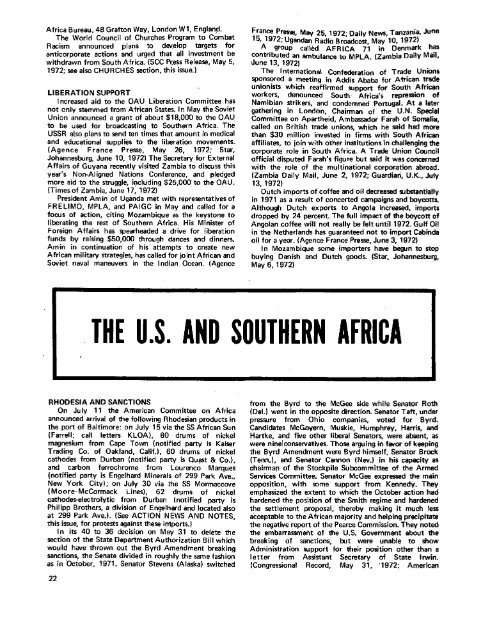
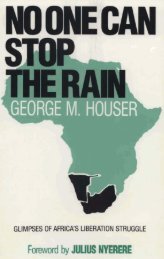
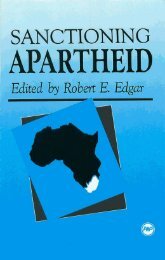

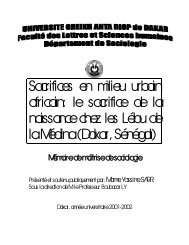
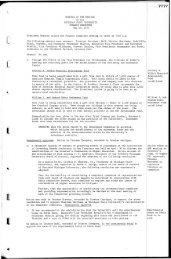
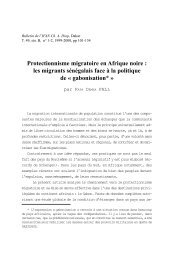
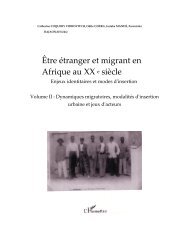
![Synthèse [6] DEFALL..INSTRAW.pdf - Matrix](https://img.yumpu.com/17880734/1/190x245/synthese-6-defallinstrawpdf-matrix.jpg?quality=85)
